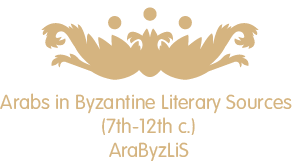The Research Project “Arabs in Byzantine Literary Sources (7th-12th c.)” is a collaboration between the Institute of Historical Research of the National Hellenic Research Foundation, Athens, Greece and the King Abdul Aziz Foundation for Research and Archives, Riyadh, Kingdom of Saudi Arabia. Its aim is to record information available in Byzantine literary sources related to the hHistory and civilization of Arabs and Arabia. Until today, a multitude of relative Byzantine texts have been selected, annotated and classified.
The information is organized on the basis of database entries which present excerpts from Byzantine literary sources. The excerpts are accompanied by metadata with reference to topics, such as administration, commerce, foreign relations, geography, nomenclature of peoples and places, material culture, warfare and more. All entries are followed by comments, bibliography and parallel sources.
The objective of this digital open-access Database is, on the one hand to make publically available all the material concerning the Arabs and Arabia in the Byzantine literary sources, and on the other to make the data available to both researchers and the wider public for reference. The material is organized in a way that makes it useful for historical research and lifelong learning projects and activities. The project opens up new perspectives for access to Byzantine texts with reference to Arabs and Arabia and becomes a valuable tool for a more in-depth study of the topics that have been at the spotlight of research in recent years.
The AraByzLiS database id powered by DeltiaDB, a database management system that provides users the graphic interface to insert, retrieve, update and revise data in a systematic and effective way. DeltiaDB collects all the information sourced from legacy text entries. It automatically splits inserted data into different types of entities and stores them using normalized tables.
Topics

The Hierarchical database model followed, is outlined in a tree-like structure with a first level of topics (thematic categories), followed by a second level of sub-topics that are assigned to the entries, as shown in the following diagram.
The project
Each entry can be assigned to up to 23 topics or subtopics. This allows for, creating groups of entries by topic or subtopic, offering to the end user flexibility and data integrity as well as filtering, quick search and data analysis.
Extensive search Functionality
DeltiaDB provides a powerful search function using keywords, phrases or filters based on predefined values, generating accurate results based on the search criteria.
DeltiaDB Advantages
Advantages over legacy processing using text files.Advantages over legacy processing using text files.
A) Controlled data entry - Integrity check – Each field corresponds to a different type of entities of the Entry. Mistakes can be easily controlled and corrected.
B) User- Friendly Interface – UI provides easy editing-access-retrieve-search operations.
C) Data normalization and Collation – Redundant data is stored in normalized table providing error-free reusability, grouping and data optimization.
D) Flexibility – New fields can be added, deleted, or transformed at any time, thus, enhancing functionality as well as expandability of the application, so as to meet future needs or changes.
E) Batch Operations – Import-Export operations provides mass data exchange in minimum time.
F) Reporting – Entries can be exported or printed in various layout formats – containing only required fields.
G) Multilanguage Support – Available Menus and Fields can be easily translated and integrated into DeltiaDB. System stability, confidentiality, integrity and reduced data usage are achieved by limiting the exchanged data to the necessary/required.
H) Statistical Analysis/Reporting – Available types of entities, can be individually examined and manipulated, providing statistical results in the terms of distribution/occupancy etc. The results of this operation provide useful information for data identification and classification.
I) Finally, the DeltiaDB organization model, simplifies data entry, update, retrieval, administration and ensures compatibility and interoperability with any available system (DBMS).

